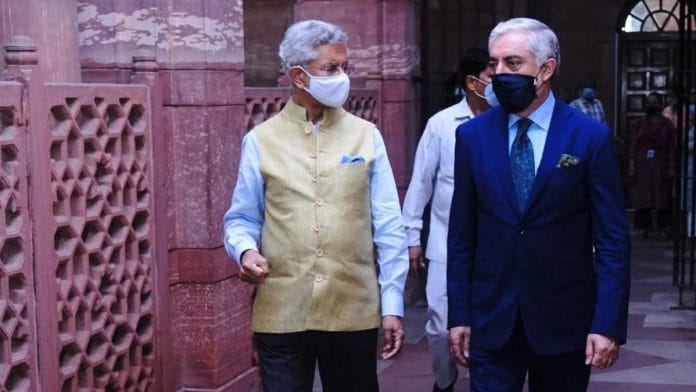New Delhi: Afghanistan’s key peace and reconciliation leader Abdullah Abdullah met External Affairs Minister S. Jaishankar in the national capital Friday as the Afghan government forces prepare a massive retaliation plan against the Taliban, sources told ThePrint.
According to sources in the Afghan government, the Ashraf Ghani dispensation is leaving no stone unturned to ensure that some of its key regional partners, including India, rallies behind Kabul as it goes for a “full-fledged retaliation” against the Taliban with the support of the US, notwithstanding the withdrawal of American troops by 31 August.
Moreover, with the Taliban getting support from Pakistan-based terrorist outfits like al Qaeda and Jaish-e-Mohammad, the Afghan government is calling it a “continuation” of the war on terror and not a “civil war”.
Although Abdullah, officially chairman of the High Council for National Reconciliation (HCNR), is on a private visit to India, he met some Indian officials as New Delhi seeks to open direct channels of communication with the Taliban.
“Always good to meet Chairman HCNR @DrabdullahCE.Appreciate his sentiments and support for our relationship. Value his insights on the region,” EAM Jaishankar said in a tweet Friday.
Always good to meet Chairman HCNR @DrabdullahCE .Appreciate his sentiments and support for our relationship.Value his insights on the region. pic.twitter.com/pOo7pfljZx
— Dr. S. Jaishankar (@DrSJaishankar) July 23, 2021
This was Abdullah’s first visit to India after his two-day trip to Doha, Qatar earlier this month where he led a high-powered delegation representing the elected Afghan government in a last ditch effort at accelerating the peace process with the Taliban’s interlocutors.
Jaishankar had met the Afghan President in Tashkent, Uzbekistan earlier this month and had assured him of India’s support for peace, stability and development of Afghanistan. He also met his Afghan counterpart Mohammed Haneef Atmar.
Abdullah’s visit comes ahead of the Delhi visit by the Afghan Army Chief Gen Wali Mohammad Ahmadzai next week.
During his three-day visit, the Afghan army chief will meet Indian Army Chief General M.M. Naravane and National Security Advisor Ajit Doval, among others. He will also visit Pune to meet the Afghan armed forces cadres there who are undergoing combat training.
Also read: India criticises Pakistan’s response to abduction of Afghan envoy’s daughter in Islamabad
Afghanistan confident of ‘continued’ US support
As the peace talks in Doha remained inconclusive, with the Taliban leaders making it clear that they will not speak to the Ghani government, the Afghan forces are now planning a “massive retaliation” against their violent activities in various parts of the country, according to the sources quoted above.
The Taliban has essentially made it clear that it will “not negotiate any further” and that the “peace talks are over”, sources said.
However, the Afghan government is “confident” of US support even as it withdraws its troops by 31 August, technically ending the 20-year-long war, added the sources.
They highlighted that the Afghan defence forces will “continue with the war on terror” — a war that was started by the US under then president George W. Bush in 2001 following the Twin Tower attacks.
Afghanistan has recently procured five Black Hawk helicopters from the US and is waiting to get 24 more from Washington. This, and financial aid were discussed during Ghani and Abdullah’s visit to the US in June, sources said.
Earlier this week, the US military launched a series of airstrikes in support of the Afghan forces, who were fighting the Taliban.
“Our commitment to the ANDSF will continue after the drawdown is complete in a largely financial and logistical support component … Our support to the ANDSF … will continue in terms of helping them have the logistical and maintenance capability to continue defending their country,” Pentagon press secretary John F. Kirby said Thursday.
Last week, the US also announced a Quad, or a Quadrilateral diplomatic forum, with Afghanistan, Pakistan and Uzbekistan.
(Edited by Amit Upadhyaya)
Also read: India plans ‘direct communication’ with Taliban as world prepares for life after US pullout






